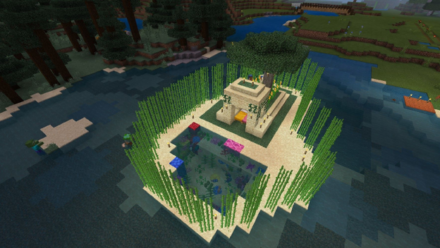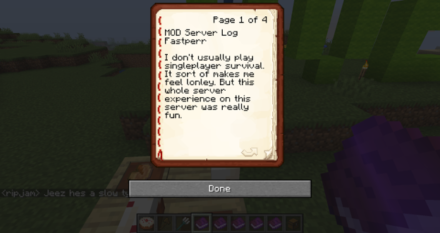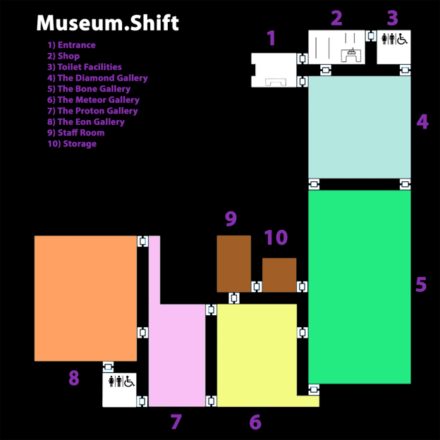Written by Dr Debbie Devis
I never thought I would be chatting about psychology and loneliness whilst running from a zombie, but COVID-19 has surprised me in unexpected ways. When the pandemic hit, we all had to adjust. For us at MOD. at UniSA, that meant we had to close galleries and set up an online exhibition called LIFE INTERRUPTED. It was important to maintain live, interactive escapes from the isolation of staying at home and so two of my pet projects were born. These projects were MOD.Craft, a public, moderated Minecraft server, and MUSEUM.shift, a tabletop role playing game (RPG) written by myself and another moderator, Josh Vanner. Both of these interactive exhibits were designed to subtly introduce science concepts to young adults, whilst also providing a safe online space to continue interaction with MOD. and others.
MOD.craft was broken into two exhibits; BIOPHILIA focused on whether nature needs to be real to gain the benefits of being outside, and in LIFE AFTER we explored whether we would choose to work together or alone after a major disaster. The greatest lesson I learned during this was the importance of community. We built up a group of regular visitors who invited friends and who were looking for company, but this led to most of the science discussions we ended up having. The regularity of moderators doing silly things like taming llamas and fiercely protecting villagers broke down some of the scary walls of “silly questions”, so our conversations became predominantly community lead as people started to ask us questions unrelated to our exhibit themes. The topics covered ranged from “What is unfalsifiability?” to “ How could we reverse gravity?”.
It is difficult to say whether this ease of comfort was driven by Minecraft or the fantastic facilitation from moderators, but minecraft provided such an easy medium to build those relationships. We built houses based on our own artistic styles and backgrounds, so visitors were able to identify which people were experts in which fields and direct targeted questions they had burning in their minds. This exploded when we set up a Discord server to allow people to talk to us in game when they weren’t playing, because people regularly came to chat, even if they couldn’t play. Overall, this made me realise the importance and power of online communities for breaking down barriers between demographics. Demonstrating that we are all just humans with all our own skills and fallibilities is what made our visitors respond so well to us and the idea of chatting science.
MUSEUM.shift was a completely different experience, and was a game designed for people to take home and play with friends. This is a roleplaying game where players pretend to be a museum worker in a fantasy museum. A single player is the “game master” and tells an open ended, choose your own adventure story that players participate in. For example, the game master might say “As you are straigenting the tapestry, you hear a bleating as a sheep pushes its way out! What would you like to do?”. Each game was completely different depending on the decisions players made and ranged anywhere from strict logical progressions to complete absurdity. These were small games of 2-5 players, so it didn’t not have the same community strength as MOD.craft, but it did allow a lot more moderator lead science.
MUSEUM.shift games don’t require any specific knowledge background, but Josh (our resident RPG expert) and I would prepare as much as we could to put accurate history, science and art principles into each game. If a player asked to search the reference library for details on wormholes, this provided us an opportunity to give them accurate information. On another occasion a player wanted to melt a slime monster, so we were able to make up a machine based on thermal resonance. The hardest part of this for us was how unpredictable each game is, but the opportunity to add a bit of science into the game became evident as soon as we started playtesting the game.
Both exhibits challenged my idea of how I communicate science. I often feel like I am not doing enough unless the science is explicit in what I am saying, but the breadth of science discussions we had in both exhibits made me reevaluate that notion and see the benefit of “unexpected science content”. I still got killed by a lot of skeletons, but at least it means somebody asked me about why plants don’t need bones.




